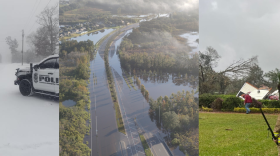DAVID GREENE, HOST:
Michigan has clearly become a hot spot in this coronavirus outbreak. There are some 15,000 confirmed cases there now. New York and New Jersey are the only states dealing with more infections than that. This is Michigan's Governor Gretchen Whitmer on Fox yesterday.
(SOUNDBITE OF ARCHIVED RECORDING)
GRETCHEN WHITMER: We've got hospitals that are already at capacity. We don't have enough personal protection equipment, and that's precisely what my call to action has been - to stay home. I executed that order almost two weeks ago. We're asking people to stay home, do their part, and we're asking everyone to chip in to help us get more PPE for our frontline responders.
GREENE: PPE, again, is personal protective equipment. And we have Dr. Steven Kalkanis with us this morning. He is the CEO of the Henry Ford Health Group in Detroit. Doctor, welcome and thanks for taking the time for us.
STEVEN KALKANIS: Good morning.
GREENE: I know your organization runs a number of hospitals in Michigan. I just wonder if you could start by telling us what you've heard from your doctors and nurses, what they've seen, what they've observed as they've watched this disease spread.
KALKANIS: Well, this has been a surreal and challenging time for us. You know, we are starting to see glimmers of hope. I have the honor of being the CEO of Henry Ford Medical Group. We have about 2,000 physicians across five acute care hospitals. And this weekend, these last 48 hours, they're really seeing a small turning point. We are preparing for a surge, but we have a statistic now where we're actually seeing more patients successfully weaned off of ventilators than those requiring intubation to go on ventilators. That's the first time we've been able to say that since this challenge began.
And so I think that, you know, at least here, the efforts for social distancing and for, you know, getting the word out to our community is beginning to work, and we're seeing results. But we do have a long way to go. We're in the middle of a surge, for sure.
GREENE: I've read that one thing you've observed in Michigan has been some serious cases of people who are in their 30s, in their 40s, which, of course, I mean, there was an assumption early on that this was a disease that hit older people, more vulnerable. What exactly are you seeing when it comes to age?
KALKANIS: We've - we're seeing two parts to this curve. The vast majority of patients are older, you know, in their 70s or 80s or even 90s. And those who have a more serious course do have underlying disease. But over the last couple of weeks, we have been surprised and saddened, as you can imagine, where, you know, we've seen a few deaths in people in their 30s and 40s. And we're, you know, investigating this from a research and scientific perspective because, quite frankly, it's not what we would have predicted.
Obviously, you know, any patient is critically important to us, but this this age group, this young age group, it's unclear why some of them - many of them, are asymptomatic. They test positive but just have a few mild symptoms. But a few develop a very, very fulminant and serious course.
GREENE: You said you're in the middle of a surge; you're seeing glimmers of hope. We hope that those glimmers grow in number in the coming days.
KALKANIS: Yes.
GREENE: But if this is going to be a difficult week, do you have the ICU beds, the ventilators, the medical supplies that you feel like you need to treat patients, if their numbers do rise?
KALKANIS: We're cautiously optimistic. We've taken a number of preparatory steps. We've cancelled all non-time-critical elective surgeries to free up ventilator space. We have tried to find innovative ways of, for instance, converting anesthesia machines to ventilators.
We have instituted a very strict PPE policy, where we do have universal masks but we are conserving them and making sure that only those employees, for instance, in patient areas or for those treating patients who are at high risk receive our N95 masks, and those others are asked to wear the masks for longer than they normally would, for instance, you know, once a day or even longer if they're not seeing patients. So in this way, we've tried to conserve as many resources as possible.
Our biggest concern is having a number of qualified people to staff our ICUs and our emergency rooms. And we're - I'm so proud of our team because we've launched a massive redeployment effort. We have, you know, people from all specialties, doctors and nurses, who ordinarily wouldn't be working in ICUs now, you know, taking on shifts and doing whatever it takes. And so this has worked so far, but, again, we're in the surge. And so I think over the next seven to 10 days, it will really test our capacity and our resolve.
GREENE: Dr. Steven Kalkanis is the CEO of the Henry Ford Health Group in the state of Michigan, which is dealing with, as he said, a surge. But he is seeing some glimmers of hope, and we hope they continue. Doctor, thanks so much.
KALKANIS: Thank you. Stay safe.
GREENE: You too. Transcript provided by NPR, Copyright NPR.







